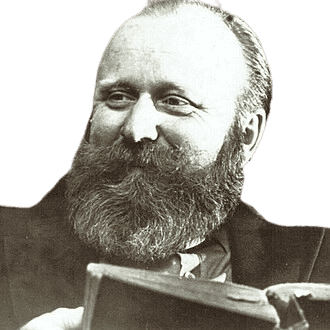Life and achievements
Early life
Frank Herbert began his life in Tacoma, Washington, in 1920. The Pacific Northwest became his childhood home, where he learned to deeply admire natural surroundings. His initial experience with nature during this period became fundamental to the ecological elements he included in Dune.
He devoted himself to reading during childhood while showing a strong interest in narrating stories. After exploring these concepts throughout his writing career, human survival, power dynamics, and adaptive behavior emerged as significant themes in his later literary creations. At an early age, he showed great interest in political matters and philosophical studies.
In 1938, he left home because of family hardships and moved to live with his aunt. His time as an independent person developed his ability to adapt and make resourceful decisions. Herbert attended Salem High School in Oregon, where his writing talent flourished.
Herbert pretended to be older than he was for his initial position as a newspaper reporter. Journalism offered him research abilities, which he would eventually use to create his novels. The political and ecological topics Herbert covered during his journalism career profoundly shaped the creation of Dune.
He joined the Navy during World War II yet received a medical discharge from military service. At the University of Washington, Herbert met Beverly Stuart, who became his future wife and provided him with his most significant source of support.
Legacy
The science fiction world remembers Frank Herbert for his massive legacy, which includes his enduring masterpiece Dune. The novel continues to affect literary, philosophical, and environmental studies significantly. Academic researchers study this work because it explores themes about power structures alongside religious elements and ecological concepts.
Through his writing, Frank Herbert became a substantial influence on multiple authors, such as George R.R. Martin, Neil Gaiman, and Dan Simmons. Because of its deep and complex storytelling, the Dune series maintains a parallel relationship with The Lord of the Rings. The ideas presented in Dune have become fundamental elements of contemporary science fiction literature.
Herbert's environmental warnings in Dune remain relevant today. Through his observations about sustainability, resource management, and human adaptability, Herbert has motivated environmentalists and intellectual thinkers.
After his death, his son Brian Herbert, along with Kevin J. Anderson, developed the Dune universe through additional writings. Together, they wrote multiple Dune prequels and sequels using Herbert's original notes to carry forward his literary legacy.
The Dune saga exists in various adaptations that sustain Herbert's original creative vision. Through his films, Denis Villeneuve has brought the Dune story back to contemporary audiences, thus demonstrating how Herbert's ideas remain relevant today.
Milestone moments
Oct 6, 1965
Dune is Published
Science fiction history shifted when Dune appeared because it presented readers with an intricate story design that defied conventional storytelling methods.
Aug 6, 1966
Wins the Hugo and Nebula Awards
Herbert received two renowned awards that established his position as a prominent science fiction writer and made Dune a global success.
Nov 6, 1976
Children of Dune Becomes a Bestseller
Dune became the first science fiction book to reach the New York Times bestseller list, demonstrating its enduring popularity.
Dec 6, 1984
David Lynch's Dune Movie Releases
The movie version of Dune encountered controversy yet managed to reach a new audience and trigger multiple adaptations for the following decades.
